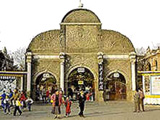
Five well-regarded academicians from Chinese academies of engineering and sciences voiced opposition last week to the idea of relocating the renowned Beijing Zoo from its current thriving site to a location on the city's outskirts.
They said the attraction has been there for nearly a century and it should be better-protected and improved instead of being moved to another place, according to China Youth Daily.
The thought of relocating the venue surfaced in February when Guo Baodong, director of the Party committee's general office of the city's Daxing District, submitted a proposal to the municipal people's congress to move the zoo to his remote district sparking hot debate.
Located between the Second-Ring and Third-Ring roads in the capital's Xicheng District, the Beijing Zoo initially named the Ten Thousand Animal Garden was built in 1908 and is one of the oldest zoological gardens in the country.
It covers an area of around 86 hectares and is home to roughly 6,000 animals within some 500 categories.
In 1972, the Chinese Government presented a pair of giant pandas from the zoo to the United States, leaving behind a fine tale in the two countries' diplomatic relations and making the zoo well-known.
Guo wants to interrupt tradition by moving the site, however, using the argument that animals kept in urban areas may transmit viruses to human beings, so they pose a severe threat to the city's public health.
Hou Baokun, director of the animal preservation department with the Beijing Forestry Bureau, was quoted by the China Central Television as saying that the transmission of SARS (severe acute respiratory syndrome) and bird flu may still possibly related to animals enclosed in urban areas.
The country was hit hard by the outbreak of SARS which killed 193 people in Beijing last year and the bird flu this year. But the exact causes of those outbreaks aren't really known, other experts say.
One of the academic opponents of the move, Zhang Li a Beijing Normal University's associate professor who is engaged in animal protection, says that creatures in zoological gardens have lived in that environment for years quite happily, so they certainly have not spread diseases to human beings.
"On the contrary," Zhang said, "zoos ought to better protect their animals from throngs of visitors flocking into zoos every day who perhaps carry various viruses that threaten animals."
Zhang also said that many other metropolises in the world, including the Britain's London Zoo, Australia's Sydney zoo, and the top American zoo in San Diego all have their zoos built near their city centres.
Another powerful point raised by Guo and his supporters is regarding animal welfare.
At the moment in Beijing, there are two wildlife garden zoos on the city's outskirts.
According to Xu Yang, head of the Badaling Wildlife Garden in northern Beijing's Yanqing County, animals enjoy more space there.
For instance, animals like bears and tigers are seen running amok in the spacious areas specifically built for them to breed.
At the meantime in the Beijing Zoo, three jackals can only move to and fro in their narrow enclosure to build up their physiques.
So Xu claimed that relocation will enable animals to lead a better life.
But Zhang, while agreeing that some shabby enclosures need face-lifts, insists decision-makers should not merely stress the enlargement of the enclosures at the expense of ignoring individual creature's needs.
The vice-director of the Beijing Zoo was quoted as saying that the improvement of animals' living environments is under way.
The last motivation listed in Guo's proposal states the relocation will help ease the capital's notorious traffic situation.
Located near the Xizhimen area where traffic jams are always seen, the zoo is partially to be blamed for increasing the traffic burden for large numbers of visitors.
According to Hou, the outlet often attracted 200,000 to 300,000 visitors daily.
But others say that expenses will increase four times more than the original fee if the zoo is moved to the city's outskirts.
The five academicians advised the government to be cautious on the issue and solicit more opinions.
(China Daily May 25, 2004)
|

